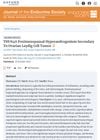
Different genes cause Female Pattern Hair Loss compared to male hair loss, and treatments vary, but more research is needed to understand it fully.
[object Object]  May 2023 in “Journal of Clinical Medicine”
May 2023 in “Journal of Clinical Medicine” New understanding and treatments for hair loss are improving, but more research is needed.
 January 2014 in “Journal of Pigmentary Disorders”
January 2014 in “Journal of Pigmentary Disorders” Women's hair gets thinner and grayer as they age, with treatments available for hair loss and graying.
October 2022 in “Reproductive health of woman” Accurate diagnosis and personalized treatment are crucial for managing women's hair loss.
April 2022 in “Medical Molecular Morphology”  21 citations,
January 2015 in “Oncology Research and Treatment”
21 citations,
January 2015 in “Oncology Research and Treatment” Scalp cooling can prevent hair loss in 65% of chemotherapy patients, especially effective in breast cancer patients and certain chemotherapy types.
 16 citations,
March 2011 in “Dermatologic Therapy”
16 citations,
March 2011 in “Dermatologic Therapy” Women with greater androgen sensitivity respond better to finasteride for hair loss.

There are many treatments for common hair loss, but more trials are needed to decide which are best.
 November 2018 in “Springer eBooks”
November 2018 in “Springer eBooks” Finasteride and minoxidil are effective, low-risk treatments for male hair loss, and patient education on these therapies is important.
 October 2022 in “IntechOpen eBooks”
October 2022 in “IntechOpen eBooks” Hair loss due to scarring can be treated by reducing inflammation, removing scar tissue, and transplanting hair. The Follicular Unit Extraction technique is effective but requires skill and time. Future focus should be on scar-less healing methods.
 January 2011 in “Humana Press eBooks”
January 2011 in “Humana Press eBooks” The document discussed hair loss causes and treatments but didn't give a final summary.
 33 citations,
September 2005 in “PubMed”
33 citations,
September 2005 in “PubMed” Dutasteride successfully treated a woman's hair loss when other treatments failed.
1 citations,
December 2022 in “Pharmaceutics” Finasteride-loaded microemulsions can effectively enhance skin delivery for treating hair loss.
 April 2024 in “Skin appendage disorders”
April 2024 in “Skin appendage disorders” Oral finasteride seems more effective for hair loss in postmenopausal women, but more research is needed.
 44 citations,
January 2013 in “International Journal of Trichology”
44 citations,
January 2013 in “International Journal of Trichology” Finasteride 5 mg/day effectively treats hair loss in postmenopausal women without hyper-androgenism.
[object Object]  1 citations,
February 2016 in “European Journal of Obstetrics & Gynecology and Reproductive Biology”
1 citations,
February 2016 in “European Journal of Obstetrics & Gynecology and Reproductive Biology” An 84-year-old woman's hair loss was due to a rare condition called Leydig cell hyperplasia, which was treated with surgery.
January 2006 in “Journal of Clinical Dermatology”  December 2020 in “Èffektivnaâ farmakoterapiâ”
December 2020 in “Èffektivnaâ farmakoterapiâ” Selenzin Peptide Active can effectively treat hair loss in postmenopausal women.
 1 citations,
January 2008 in “Actas Dermo-Sifiliográficas”
1 citations,
January 2008 in “Actas Dermo-Sifiliográficas” Treat hair loss in postmenopausal women with diet, avoiding certain drugs, and using medications like minoxidil or finasteride.
 February 2021 in “Endocrinology, diabetes & metabolism case reports”
February 2021 in “Endocrinology, diabetes & metabolism case reports” A postmenopausal woman's excessive hair growth and hair loss were due to a non-cancerous ovarian condition, treated successfully with surgery.
 October 2023 in “Journal of the Endocrine Society”
October 2023 in “Journal of the Endocrine Society” A woman's increased facial hair and hair loss were caused by a rare ovarian tumor, cured by surgery.
 329 citations,
January 1997 in “Journal of the American Academy of Dermatology”
329 citations,
January 1997 in “Journal of the American Academy of Dermatology” Frontal fibrosing alopecia is a hair loss condition in postmenopausal women, similar to lichen planopilaris, with ineffective treatments.
 14 citations,
January 2015 in “Current problems in dermatology”
14 citations,
January 2015 in “Current problems in dermatology” Female pattern hair loss treatments vary in effectiveness and may have side effects.
 June 2020 in “International Journal of Research in Dermatology”
June 2020 in “International Journal of Research in Dermatology” Early postmenopausal women often experience skin issues like vaginal dryness, swallowing difficulties, hair loss, and uncommonly, keratoderma and hirsutism, but many are unaware these are related to menopause.

The document concludes that hair loss in women can be treated with topical treatments or hormone therapy depending on the cause.
January 2011 in “Journal of Diagnosis and Therapy on Dermato-venereology” Genetics, low estrogen, and low iron levels contribute to female hair loss, with specific scalp signs indicating severity.
 57 citations,
January 2003 in “Clinical and experimental dermatology”
57 citations,
January 2003 in “Clinical and experimental dermatology” Postmenopausal frontal fibrosing alopecia is a type of hair loss in postmenopausal women that may stop on its own but has no effective treatment.
 17 citations,
February 2003 in “Australasian Journal of Dermatology”
17 citations,
February 2003 in “Australasian Journal of Dermatology” Hair loss in postmenopausal woman caused by ovarian issue.
 1 citations,
May 2011 in “Journal of Obstetrics and Gynaecology”
1 citations,
May 2011 in “Journal of Obstetrics and Gynaecology” Hair loss in postmenopausal women due to ovarian hyperthecosis is rare, but removing the ovaries can significantly improve the condition.
September 2019 in “Clinical research in practice” High-dose finasteride effectively treats hair loss in postmenopausal women.
























